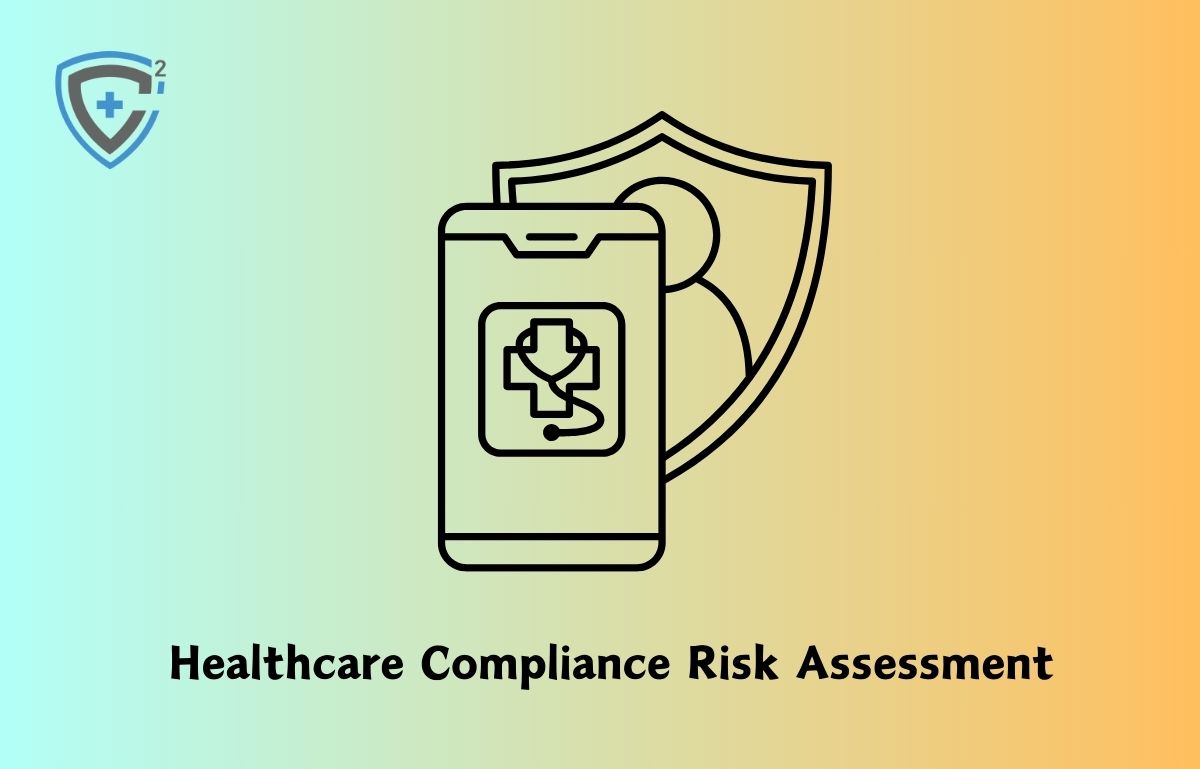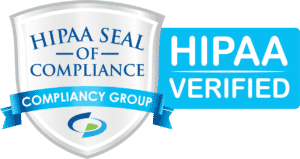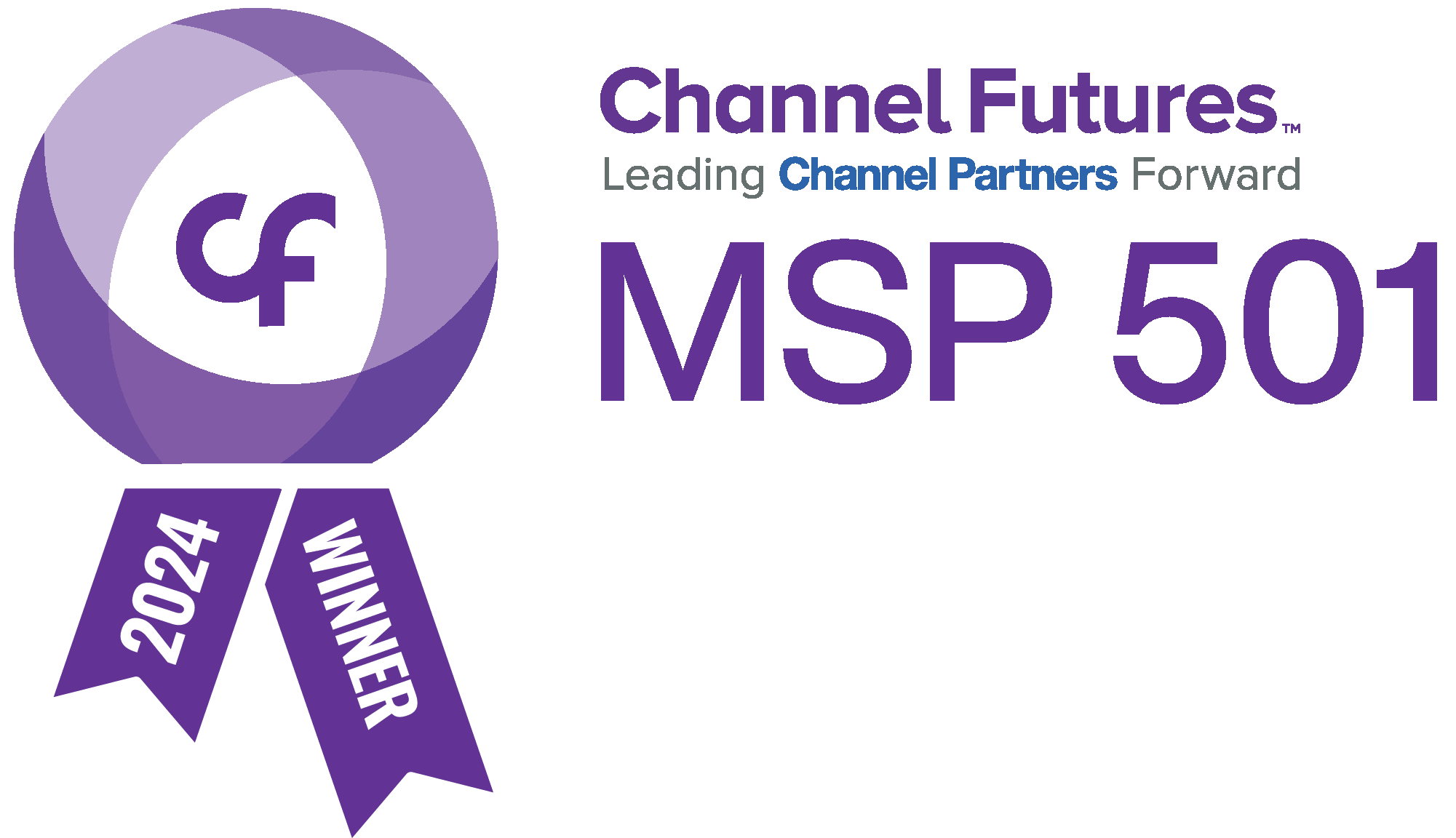Compliance is one of the basic requirements from the patients’ safety point of view and the legal point of view as well as the organizational point of view. The Healthcare Compliance Risk Assessment, therefore, is not only today’s statutory demand, but is also the guide to changing risks and creating confidence. Due to the fact that rules and regulation change with time, it becomes hard for the healthcare organizations to fully comply. If you find yourself having to navigate the different compliance issues involving the healthcare industry, Compliance Choice offers customized services to help you meet your goals easily and efficiently.
What is Healthcare Compliance Risk Assessment?
Healthcare Compliance Risk Assessment is the process of systematic identification, evaluation, and mitigation of risks associated with a myriad of regulations governing the healthcare industry-from data privacy under HIPAA to workplace safety under OSHA. These assessments will serve to make sure that the all legal, ethical and operational requirement have been met. A compliance audit entails going through current set policies in compliance and the identification of the loopholes and then following it up by putting measures in place to cover them up.
Why is Healthcare Compliance Risk Assessment Crucial?
1. Regulatory Adherence
Without doubt it holds be said that healthcare is one of the most heavily regulated sectors on the globe. Noncompliance to laws like HIPAA & HITECH and OSHA come with major penalties, lawsuits and reputation penalties. This shows that a comprehensive risk analysis is not only going to protect and organization from losses and external audits’ penalties but also ensure compliance with regulatory needs. This remains proactive and ensures that potential risks have been dealt with alongside giving stakeholder faith.
2. Patient Data Security
Patient’s data are more vulnerable today than before because of the rising rate of cyber threats and invasions of privacy. Since health care organizations work with differentiated personal and medical data, of course, they are attractive for cybercriminals. By conducting risk analyses, organizations stand in a vantage-profile to discover the areas of weakness within their systems, to incorporate technologies of encryption besides setting up barriers to secure patient information.
3. Operational Efficiency
Compliance risk assessment ensures that the body unlocks further efficiencies thus coming up with solutions to the common issues of redundancy in the activity workflows. In doing so, effectiveness of practical operating organization is improved through the mitigation of lack of legal compliance; hence effective deployment of resources in meeting legal requirements.
4. Financial Safeguards
Failure to adhere to the legal policies is very costly. Such cost reaching extents of penalties and legal fees, not forgetting the loss of patients’ confidence. Such efforts boost these practices to help prevent loss, and to retain operational viability with minimal reputational damage while doing periodic risk analysis. That is why at Compliance Choice, we provide professional compliance risk assessment services, so that healthcare organizations could harness all the above listed benefits.
Steps to Conduct an Effective Healthcare Compliance Risk Assessment
Here the steps to conduct an effective healthcare risk assesment:
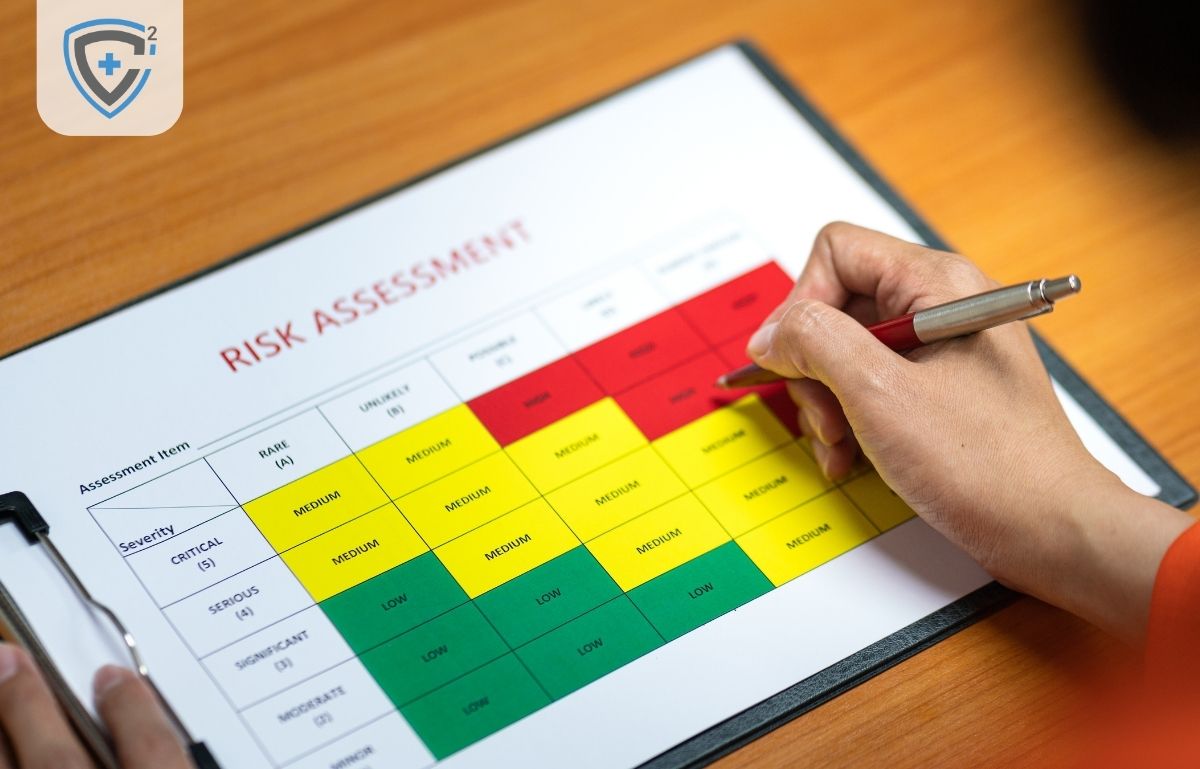
1. Understand Applicable Regulations
The first one of the steps in compliance risk management means realizing the rules governing your company. Whether these are the HIPAA, or the OSHA, or the Stark law or any such other law, each of these has laid down their own norms. Non-compliance will not be accepted based on ignorance of any of these regulations, so it becomes crucial to monitor. Compliance Choice makes work easier at this step as it provides a detailed description of compliance information you need to implement based on your organization’s operations.
2. Create a Risk Inventory
Each healthcare organization presents its own set of unique risks. Developing a comprehensive inventory requires listing out potential risks in various areas, including cybersecurity, employee conduct, patient care, and financial transactions. The inventory allows the organization to take a focused approach toward mitigating those risks.
3. Assess Current Policies
Outdated policies pose a high risk to compliance. Periodically reviewing and updating your organization’s existing policies ensures they meet the current regulations. Gaps or outdated practices need to be identified as crucial steps in penalty avoidance and maintaining operational integrity.
4. Prioritize Risks
Not all risks are created equal. Some present real, imminent threats to either patient safety or data security, while others pose little threat. Prioritization of risks according to their probability and potential impact enables an organization to use its resources efficiently and effectively, focusing first on the most critical areas.
5. Develop Mitigation Strategies
Once the identification and prioritization of risks have been made, it will be time to take concrete actions toward their mitigation. This could be done by changing access controls, improving IT infrastructures, or running selective training programs for employees in order to mitigate risks effectively.
6. Regular Monitoring and Auditing
Compliance is not an event; it’s a developmental process. As in the case of any other regulations, these will help you to run your audits and monitor your organization and ensure that you are … This paper outlines how Compliance Choice will assist the health care provider to develop a meaningful compliance monitoring system that will be sustainable in the long run.
Common Risks in Healthcare Compliance
Data Breaches
The primary consideration is that most health organizations fall prey to cyber criminals since they deal with personal data. Any such breach or violation will attract stiff penalties under HIPAA, and therefore serious measures need to be taken to enhance cybersecurity.
Lack of Employee Training
Employees who are not aware of compliance may accidentally expose the organization to certain risks. Compliance awareness requires regular training programs throughout all levels of the organization.
Inadequate Incident Response Plans
Breaches or compliance violations, if responded to with delays, may lead to greater damages financially and reputational. There should be a robust incident response plan in place that will minimize damage.
With the support of Compliance Choice, healthcare organizations can identify such risks much earlier and take necessary actions towards mitigating them.
Benefits of a Strong Healthcare Compliance Risk Assessment
1. Enhanced Patient Trust
Compliance means commitment to patient safety and privacy. Showing strong compliance reassuringly tells patients that their data and well-being are cherished, thus building trust for the long term.
2. Regulatory Confidence
Regular risk assessments indicate a proactive attitude toward compliance, and this gains the trust of regulators and auditors. This could lower the chances of surprise visits and fines.
3. Improved Employee Performance
Workers who are better educated and better prepared are more apt to comply with the set standards of compliance. This improves general organizational effectiveness and lessens the risks associated with human error.
4. Competitive Advantage
A compliant organization is more favorable with patients, investors, and partners. The compliance to rules points to efficiency, dependability and quality. The beauty of it all is that every health care organization can gain all these advantages when they decide to hire the services of Compliance Choice in a very simple and cost efficient manner.
How Compliance Choice Can Help?
At Compliance Choice, we offer tailored solutions for healthcare organizations to navigate the complexities of compliance risk assessment effectively.
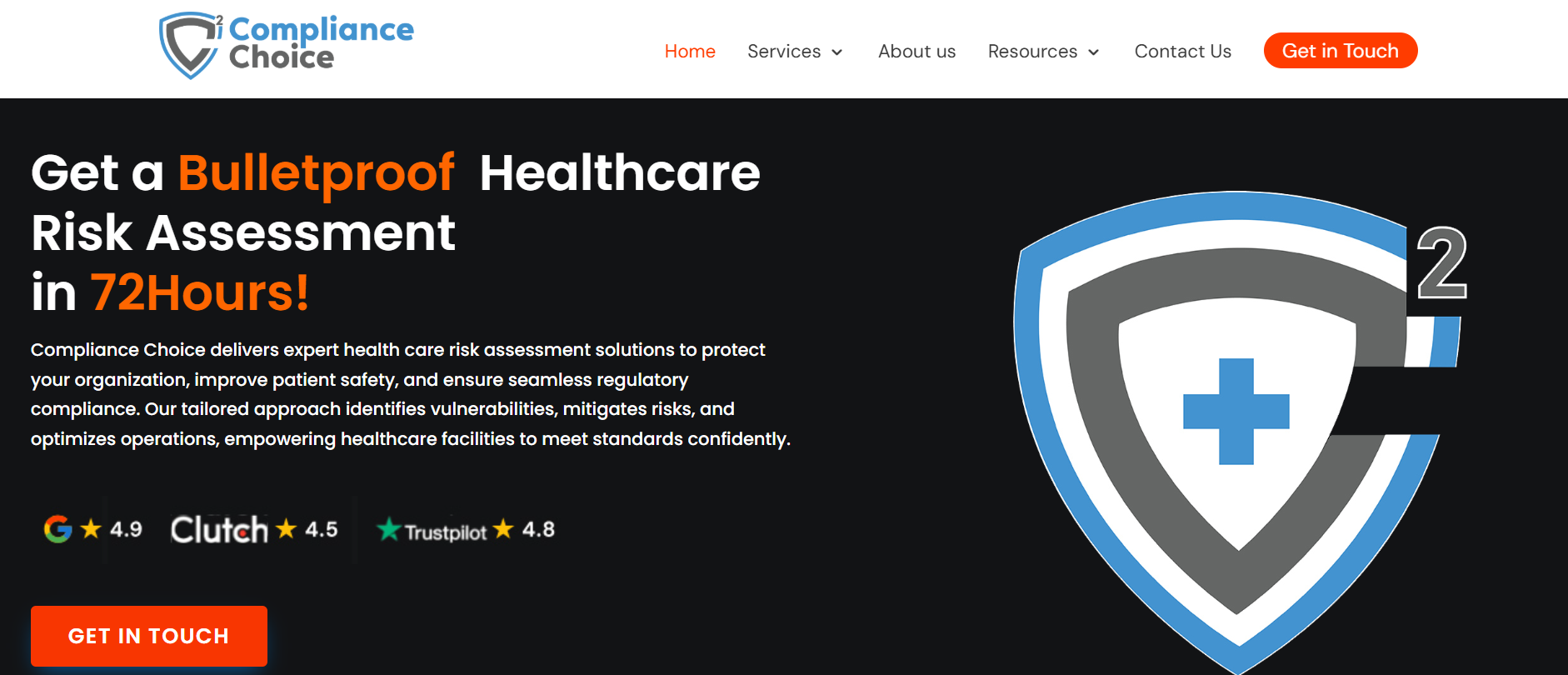
Our Services Include:
- Comprehensive Risk Assessments: Identify vulnerabilities and implement effective solutions.
- Policy Development and Updates: Keep your policies aligned with the latest regulations.
- Ongoing Support: Stay compliant with regular audits and updates.
Why Choose Compliance Choice?
- Industry expertise in healthcare compliance risk assessment.
- Customized solutions to fit your organization’s needs.
- Reliable and proactive support for long-term compliance.
Conclusion
Healthcare compliance encompasses much more than a regulatory requirement but is about safety, trust, and operational excellence. A comprehensive Healthcare Compliance Risk Assessment shields organizations from penalties, builds patient trust, and ensures efficient operations. With Compliance Choice, providers receive the tools and expertise to make compliance seamless. Let us help you secure a compliant and successful future today.

